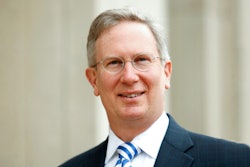Long-neglected Chicago State University has a powerful friend in the Illinois Legislature, and the school is not even in his district.
Illinois state Sen. Emil Jones Jr., DChicago, has long been an advocate for public education. In fact, it’s hard to find anyone in the state who won’t acknowledge this fact, even among those who don’t always agree with his tactics.
Since he graduated from Roosevelt University and later entered the Illinois State House of Representatives in 1973, the Chicago native has made educational reform from kindergarten to college a cornerstone of his public service.
But in recent years, he has turned his attention more specifically to Chicago State University, the 139-year-old university on the South Side of Chicago with a history of facing obstacles — including declining enrollment, dilapidated buildings and low faculty salaries.
When Jones was elected president of the Illinois State Senate five years ago, he vowed to change things at CSU, ultimately wielding his power as a legislator to secure funds for a university that until recently was considered one of the state’s most neglected institutions of higher education.
Ironically, CSU is not even located within Jones’ legislative district. But none of that matters to him. The 72-year-old politician has made the school his personal crusade and is working in Springfield — the state’s capital — to help revitalize the university where the student population is close to 80 percent Black.
“Chicago State University is a predominantly minority university, and they need someone to be their advocate,” says Jones, who has been criticized in the past for proposing controversial education legislation. For example, several years ago, he successfully petitioned and helped pass legislation that now requires the teaching of Black history and Holocaust history in Illinois schools. The proposal was met by some critics who questioned whether such a requirement was necessary. And he spearheaded a successful internship and scholarship program for minority students across the state, although other states are moving away from race-conscious programs for fear of facing major lawsuits.
His lobbying efforts on behalf of CSU were satisfied last year when the university opened its $38 million, 171,000-square-foot convocation center. The center has a capacity of 6,500 and is one of the largest venues of its kind in the South Side of Chicago. It is currently used for university commencement, convocation ceremonies, athletic programming and concerts. The center is also a part of the city’s 2016 Olympic bid proposal.
In exchange for helping to secure the funds needed to build the convocation center, the school named the building after Jones and his late wife, Patricia, a reminder to students and faculty that they have a powerful advocate walking the corridors of the statehouse.
“He has really been a patron saint for Chicago State University,” says Dr. Elnora D. Daniel, the retiring president of CSU. “He’s really been pivotal in ensuring that we’ve received funding.”
Jones says that early on he realized that his colleagues in the Illinois State Legislature were aggressively lobbying for funds to support a variety of colleges and universities across the state and decided to follow suit. He was dismayed, however, to learn that CSU was the only college that did not have its own convocation center and was further troubled to learn that the school’s faculty were paid much less than their counterparts at nearby schools.
“For years, the school was not taken care of very well,” says Jones. “We are trying to bring it up to par with other universities in the state.”
When Daniel became president of CSU in 1998, the situation began to turn around. She joined forces with Jones, and the two worked together to develop a strategic plan that was targeted at sprucing up the campus and strengthening the school’s academic offerings. Earlier this year, CSU announced that it has launched a doctoral program in pharmacy and educational leadership.
Now, after 35 years in public office, Jones says that he remains committed to CSU and will continue to advocate for the campus as it continues to expand. “I face my share of criticism for doing my share for the university,” he says. “But other lawmakers have done the same thing over the years.”
Click here to post and read comments
© Copyright 2005 by DiverseEducation.com


















